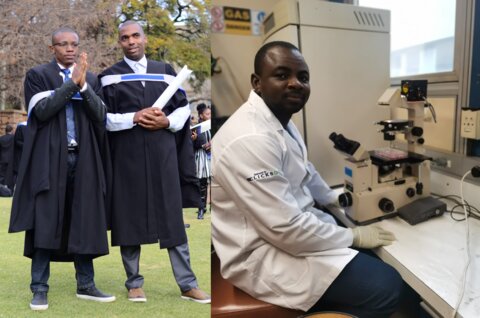Q&A with our first PAMAfrica graduates

With the end of the academic year upon us, we are thrilled to announce that three of our PAMAfrica students are set to graduate from University of the Witwatersrand, Johannesburg. Congratulations to Alberto Chaque (CISM, Mozambique) and Fabrice Mougeni (CERMEL, Gabon) for completing their MSc degrees in Epidemiology with a focus on Biostatistics. Georges Somé (IRSS, Burkina Faso) has submitted his final research report for evaluation and is set to officially graduate before the end of the year. To celebrate this occasion, we sat down with the students and asked them to reflect on their studies and experience as part of the PAMAfrica Consortium.
Can you tell us how being part of the PAMAfrica Consortium has helped your personal and academic development?
Alberto: As part of PAMAfrica’s capacity-building efforts, I was fortunate to be awarded a master's scholarship in biostatistics for a duration of 18 months at Wits University. This scholarship provided me with an invaluable opportunity to learn about the latest statistical methods at one of Africa's top universities. Additionally, it has played a crucial role in enabling me to establish a network and collaborate with fellow students from various African countries. This scholarship has been instrumental in shaping my career and has paved the way for me to pursue a profession as a data analyst.
Georges: Being part of the PAMAfrica Consortium has really helped my scientific development. Firstly, the fact of having benefited from the support through the training grant has made it possible to raise my level of education. In addition, the qualifying training offered allowed me to be more competitive and competent in epidemiological research, learn the appropriate quantitative methods for the design of a research project and compete at the national and international level in calls for project grants. I also learned how public health programs work and how to develop strategies to improve the effectiveness of these programs. Being part the consortium was the starting point for a career in research, which can help policymakers and other researchers develop epidemiological surveillance strategies to control the incidence of infectious and non-infectious diseases.
Fabrice: This opportunity has given me access to high-quality teaching, which helped me considerably strengthen my knowledge of biostatistics in particular, but not only limited to spatial analysis or conducting research in general.
What's next for you once you graduate?
Alberto: Driven by my passion for combating malaria and contributing to its eventual eradication, I am committed to advancing my education through a PhD programme and ultimately contribute to the global initiative of reducing the burden of malaria. A crucial aspect of my motivation is to bolster capacity in malaria-endemic regions by providing training to local researchers and public health practitioners in the realm of data analysis. By equipping individuals within these regions with analytical skills, we can fortify collective efforts in the fight against malaria and achieve improved public health outcomes. Additionally, I seek to cultivate collaborations with experts from diverse fields, such as epidemiology, ecology, data science and social sciences. By harnessing the knowledge and expertise from these varied disciplines, we can develop comprehensive approaches that effectively address the intricate and multifaceted aspects of malaria transmission and control.
Georges: The next step for me is to make the consortium benefit from the training I have received. I will return to my original research institute, the Clinical Research Unit of Nanoro, to help carry out the activities of the center and the PAMAfrica Consortium. My studies have led me to a level of deep understanding in research to the point that I can compete nationally and internationally. Through training, we can help our research institute shine and excel in the coming years. Malaria remains the main cause of consultation, hospitalization and death in the country's health facilities. It mainly affects children and pregnant women. This is why our future intervention actions must focus on this scourge. We will therefore intervene in the modelling system to guide the control of this disease and other diseases that threaten the health of the population. We are determined to carry out further malaria-related research activities.
Fabrice: Over the next few years, I'll try to get involved in strengthening biostatistics in our region and focus on biostatistical research related to malaria or any other disease prevalent in sub-Saharan Africa. There is a lot of data that requires advanced methods in the way it is analyzed to extract useful information to help mitigate current infections.
Is there anything else you would like to share?
Alberto: I would like to express my heartfelt gratitude to everyone who made invaluable contributions to my master's journey, and the MMV and local team for their precious support and guidance in shaping my academic and professional growth.
Below is a video made in 2021 featuring PAMAfrica students, including Alberto and Fabrice, introducing themselves and sharing why they are interested in malaria.